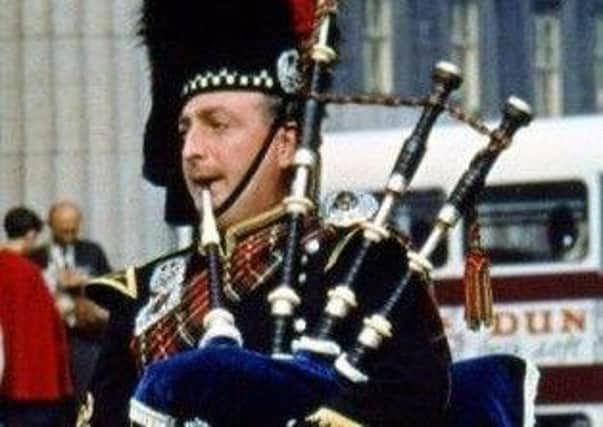Iain McLeod


When Iain McLeod got the chance to learn the bagpipes at the age of 11 it was the catalyst for a spectacular career that would earn him global acclaim and put Edinburgh City Police Pipe Band on the worldwide stage.
The sports-mad schoolboy had just finished a physical education session at the capital’s George Heriot’s School when the Officers’ Training Corps leader asked if anyone would like to take up the instrument. His first lesson, in 1942, was under the tutelage of James Sutherland, former pipe major of the Argyll and Sutherland Highlanders. As a teenager Iain studied for a year at Edinburgh Castle, under pipe major Willie Ross, and later studied piobaireachd with the renowned pipe major Donald MacLeod.
Advertisement
Hide AdAdvertisement
Hide AdBy 18 he had been invited to join the Edinburgh City Police Pipe Band as a guest player and ultimately took the outfit to iconic status, winning the World Pipe Band Championships five times, touring internationally and appearing in films including the original Casino Royale and Journey to the Centre of the Earth. Iain, a proud Leither all his life, was also a distinguished solo piper.
The son of Gaelic-speaking merchant seaman turned rigger Donald McLeod from Clachtoll, Sutherland and his wife Ruby, he was brought up in North Leith by parents who, having lost their first son in infancy, did all they could to give him the best start in life. Educated at North Fort Street Primary where he was dux, before attending George Heriot’s, his main interest in life was sport, particularly football.
Called up for National Service not long after becoming a guest member with the police pipe band, he served with the Royal Scots Greys and continued to play the bagpipes with the regimental pipes and drums. After being demobbed he joined the Edinburgh Police Force and its band, comprised almost entirely of serving police officers, becoming its pipe major in 1959.
They were global ambassadors for the city and the go-to band for a wide variety of events: in the 1950s film credits included Battle of the Sexes and Happy Go Lovely and they brushed shoulders with Peter Sellers and Peter O’Toole, who could apparently play the pipes; at the height of the Cold War in 1966 they went to Moscow to perform at an event promoting British trade and industry where they met Prime Minister Harold Wilson and the Russian premier Alexei Kosygin. The band was also renowned for its daily Princes Street parade during the Edinburgh International Festival and had close links with the Queen’s bodyguard in Scotland, The Royal Company of Archers, and the High Constables of Edinburgh.
Meanwhile, under Iain’s leadership they reached the top in competitions, winning every major award open to pipe bands, including the World Pipe Band Championship in 1963, 1964, 1971 and 1972 – the year they also won the Inter-continental Championships in Toronto – and 1975. Although they were also serving police officers, members toured Europe, Canada and the USA, Japan and South Africa. And Iain himself was competing as an individual, picking up three Silver Stars at the prestigious Northern Meeting competitions in Inverness and the John Player Gold Banner and Gold Pennant for former winners at the National Mod piping contests.
He was also a pioneer of extending the repertoire of pipe bands during the 1960s by introducing jigs and hornpipes and, when medleys were introduced to major competitions in 1970, his own innovative groupings of tunes enabled the band to make the successful transition from the traditional competition format of march, strathspey and reel. The band released five LPs during his time as pipe major and he released his own solo LP for Highland dancing.
In 1972, while still serving with the police, he bought over Forfar-based R Gillanders & Son bagpipe makers, which had a long and proud tradition, and mindful of this he incorporated the name to form Gillanders and McLeod. Four years later, having completed 25 years’ service with the force, he retired as a sergeant, and concentrated on developing his firm. He opened a retail outlet and head office in Edinburgh in 1977, moving to new premises in 1999, and build up the business, which was a contractor to HM Government and supplied bands and players in the UK, Europe, the USA, Canada, Australia, New Zealand and Malaysia.
A man of high standards, strong views and straight talking, he brought all these characteristics into play as a pipe major and adjudicator. And as managing director of Gillanders and McLeod he was determined to produce only the highest quality instruments, personally testing each piece before dispatch.
Advertisement
Hide AdAdvertisement
Hide AdBehind his public persona was a devoted family man with an extended family who were constantly amazed by the fact that wherever in the world they travelled, they always met someone who knew Iain. In addition to sport – he was a dedicated Hibs and Manchester United fan – he loved to travel and often managed to combine both, enjoying trips to the Prix de L’Arc de Triomphe in Paris, racing in Ireland, the Breeders’ Cup in America and the racing World Cup in Dubai, where he met jockeys including Lester Piggott, Frankie Dettori and Willie Carson. His final trip was to Clachtoll, the family croft where he spent many summers as a boy.
Last year he released a CD, Edinburgh City Police Pipe Band Revisited, his own personal selection of tunes from the glory years of one of the globe’s most universally recognised and successful pipe bands. Part of his lasting legacy to the pipe band world is that, despite being recorded 50 years ago, the distinctive piping sound of the band more than stands the test of time in the 21st century.
Iain is survived by his wife Mary, and family of Ally, Mairi, Iain, Calum and Alan, five grandchildren and five great grandchildren.
ALISON SHAW